
AI and deep learning models such as GPT-4 are disrupting how companies exploit data. However, the GPT-4 context is restricted as it relies on partial information over a limited period. But there’s a solution to improve GPT-4 use cases: web scraping.
Let’s discover how web scraping and automated big-data extraction can supercharge GPT-4 technology and enhance its performance, efficiency, and applications.
Although GPT-4 uses a decent amount of information, this background can become problematic when working with big data. Web scraping companies, such as WebRobot, can help you remove this constraint by collecting and structuring a massive quantity of web data. Such data can then be used to train GPT-4 models and let them give you better results in multiple applications.
We identified 10 use cases where combining web scraping and GPT-4 can offer you a powerful tool to leverage in your business.
Top GPT-4 Use Cases with Web Scraping
1. Sentiment Analysis: you can use data scraping to collect massive amounts of social media posts, product reviews, and customer comments. GPT-4 can then analyse this data to determine the public opinion on a particular topic, brand or product.
2. Competitor Monitoring: data scraping can help you monitor competitors’ websites, gathering information on pricing, new product releases, promotions, and marketing strategies. GPT-4 can then analyse this data to help companies better understand their competitors’ tactics and develop effective competitive strategies.
3. Market Research: web scraping can collect data from various online sources, such as news sites, blogs, forums and social media, to provide an overview of the market. GPT-4 can analyse this data to identify emerging trends, understand customer needs and guide strategic planning.
4. Lead Generation: through web scraping tools, you can collect prospect information from various websites, such as demographics, contact details, and online behaviour information. GPT-4 can use this data to generate high-quality leads and personalise marketing campaigns.
5. SEO Analysis: you can use a data scraping service to collect data on search engine rankings, keywords used, and backlinks. This data may be used by GPT-4 to provide suggestions on how to optimise website content and improve visibility in search engines.
6. Trends Forecast: your company can identify emerging trends in various industries by using data scraping to gather data from multiple news sources, social media, and blogs. We can employ this data in GPT-4 model training to predict future trends based on historical models.
7. Financial Analysis: tailored web scraping services can collect financial data from various news and analysis sites to provide insight into stocks, bonds, commodities and other financial instruments. Then, you can integrate with GPT-4 capabilities to analyse this data and get trading forecasts or investment recommendations.
8. Accademi Research: researchers can utilise data scraping tools to collect research and academic articles from various online databases. This data can then be used by GPT-4 to analyse research trends, summarise findings, and generate new research hypotheses.
9. News Monitoring: journalists, press review agencies, and analytics companies can use data scraping for regular online news scanning. GPT-4 can then analyse this information to identify critical events and breaking stories to create a news summary.
10. Automated Customer Support: data scraping can collect the most common customer questions from various forums and support sites. You can train GPT-4 on this data to provide automated responses to customer queries.
These use cases require a lot of data to train and fine-tune the GPT-4 models and keep them up-to-date and accurate. That’s why you need web scraping to get a constant stream of fresh data.
GPT-4 Use Cases: Sentiment Analysis
Web scraping with GPT-4 can offer significant advantages to improving sentiment analysis. Here’s how.

Data Acquisition: Web scraping is a technique to extract large amounts of data from websites. The data on websites is unstructured. Web scraping enables you to convert this data into a structured form. In sentiment analysis, this could mean scraping user reviews, comments, tweets, or other public opinion data from websites. This provides a rich and diverse data source for training and testing sentiment analysis algorithms.
High-Quality Text Generation: GPT-4, the successor of GPT-3, is an advanced AI model developed by OpenAI. It’s been trained on a wide range of internet text and has exceptional capabilities in generating human-like text. It can generate contextually appropriate responses and handle long-form text generation with contextual relevance. It can significantly improve the quality of sentiment analysis by providing high-quality text generation.
Understanding Context: Sentiment analysis often falls short when it must understand the context in which words are used. For example, sarcasm is difficult for many sentiment analysis algorithms to grasp. However, GPT-4 is trained to understand the context better than previous models. This can lead to more accurate sentiment analysis, as GPT-4 can better understand the subtleties of language, including context, irony, and sarcasm.
Language Support: GPT-4 can work with many languages. This makes it possible to perform sentiment analysis on a truly global scale.
Handling Ambiguity: GPT-4’s sophisticated understanding of semantics and pragmatics could help address another common problem in sentiment analysis: ambiguity. Human language is replete with words and phrases carrying different sentiments in different contexts. You could build more robust sentiment analysis tools by harnessing GPT-4’s capacity to discern nuanced meanings.
Real-time Analysis: by integrating web scraping with GPT-4, your business can monitor, in real-time, the public sentiment towards your products or services while social scientists can study public opinion dynamics.
Transfer Learning: GPT-4 can be fine-tuned on a specific task after its initial pre-training, enabling it to leverage its extensive training and quickly adapt to new assignments. For sentiment analysis, this could mean fine-tuning GPT-4 on specific types of sentiment data, such as product reviews or social media comments, enhancing its performance on these tasks.
GPT-4 Use Cases: Competitor Monitoring
In the contemporary business world, staying one step ahead of the competition has never been more critical. Competitor monitoring (the tracking, analysing, and understanding process of your competitors’ strategies) is integral to maintaining and enhancing your market position.

Here’s how combining web scraping and GPT-4 technologies can supercharge your competitor’s monitoring strategy.
Comprehensive Data Collection: competitor monitoring relies heavily on data. Web scraping allows you to gather millions of structured data from hundreds of online sources — competitor websites, social media platforms, review sites, and more. This data includes valuable insights, from product listings, prices, customer reviews, and marketing tactics, to keyword usage.
Real-Time Insights: web scraping allows you to monitor your competition’s actions as they happen. Coupled with the processing power of GPT-4, which can analyse and generate insights from the scraped data in real time, you can keep your finger on the pulse of your market, making swift decisions to stay ahead.
Enhanced Text Analysis: GPT-4 sophisticated language comprehension can make sense of the high volumes of text data gathered via web scraping. By leveraging GPT-4, businesses can gain a deep understanding of the sentiment behind customer reviews and social media posts. This knowledge can provide insights into what customers like and dislike about your competitor’s products and services, helping you to position your offerings effectively.
SEO Strategy Analysis: web scraping can reveal your competitors’ SEO strategies by analysing their keyword usage, meta tags, content structure, backlink profiles, and more. You can combine web scraping with the GPT-4 to understand the context, generate relevant content, and use this information to guide you in optimising your SEO strategies and outperforming your competitors in search rankings.
Predictive Analysis: GPT-4, thanks to its machine learning capabilities, can use the data obtained through web scraping to predict your competitors’ future behaviour. By analysing patterns in your competitors’ actions, GPT-4 can provide forecasts about their potential marketing strategies, product launches, and pricing adjustments, giving you a competitive edge.
Enhanced Market Trend Understanding: by analysing a broad array of data from multiple competitors, GPT-4, thanks to its understanding of nuanced language, can help you pinpoint emerging trends, preferences or concerns among customers to help you adapt your business strategy proactively.
GPT-4 Use Cases: Market Research
In today’s dynamic economy, market research is key to staying competitive and attaining growth.
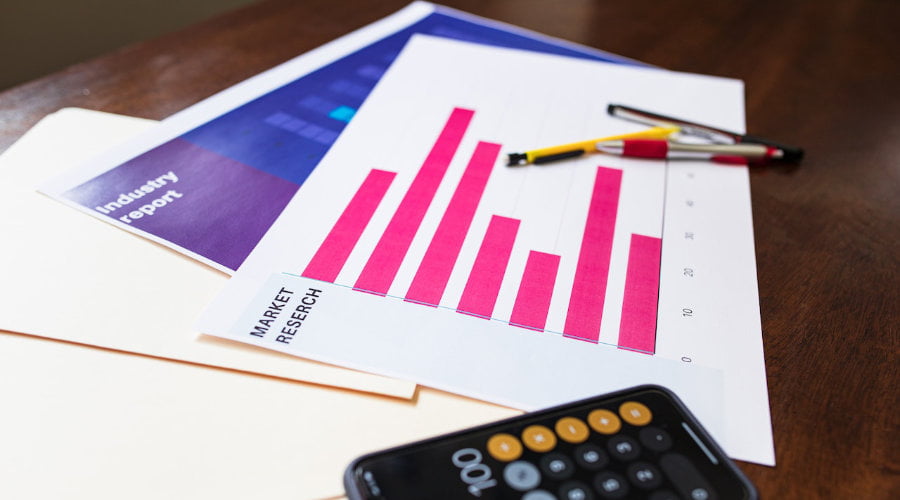
Here’s where the blend of web scraping and GPT-4, two innovative technologies, comes into play. When combined, they hold the potential to transform the landscape of market research. Here’s how.
Extensive Data Collection: market research is all about data. Web scraping can amass a vast trove of structured data from numerous online sources (blogs, social media platforms, online forums, news sites, product listings, etc.). This diverse data set provides a holistic picture of market trends, customer preferences, and competitive dynamics.
Real-Time Market Insights: web scraping facilitates real-time data extraction, offering up-to-the-minute insights about the market. Coupled with the real-time analysis capacity of GPT-4, businesses can gain a real-time understanding of the market, enabling timely and informed decisions.
Advanced Text Analysis: GPT-4 can process and analyse the large volumes of text data collected via web scraping. It can examine customer reviews, social media posts, and more, providing a deep understanding of market sentiments, customer concerns, and emerging trends.
Predictive Market Analysis: one of the most intriguing applications of GPT-4 is its predictive abilities. Using historical data obtained through web scraping, GPT-4 can identify patterns and trends to forecast future market shifts, helping your business prepare and plan strategically for what lies ahead.
Identifying Market Trends: you can detect overarching market trends by analysing a broad spectrum of data points from diverse sources. GPT-4’s nuanced language understanding can help identify these trends, enabling you to adapt your strategies proactively to meet evolving customer needs and market demands.
GPT-4 Use Cases: Lead Generation
Today, the digital marketing industry is rapidly evolving. In this landscape, lead generation is essential for your business growth. The merger of web scraping and GPT-4 advanced AI model is proving to be a game-changer in this field.
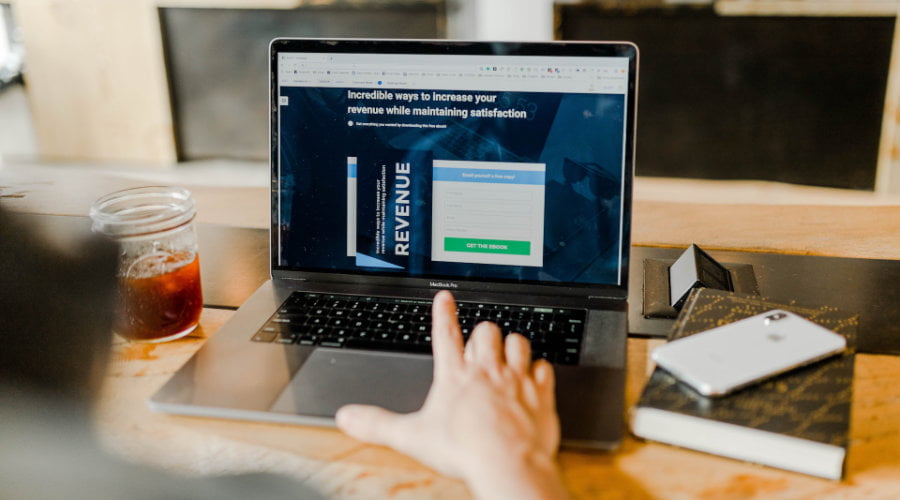
The integration of these two technologies promises to revamp lead generation activities significantly for six reasons.
Broad-Spectrum Data Collection: web scraping is a treasure trove to collect data. It can harvest a wealth of structured data from numerous online platforms, such as social media, business directories, and discussion forums. This data can provide in-depth insights into potential customer profiles, interests, and online behaviours to identify and attract prospective leads.
Real-Time Lead Insights: real-time data collection via web scraping tools allows your business to monitor potential leads’ activities as they occur. When you pair it with GPT-4 real-time data analysis, you can monitor lead behaviour and trends, facilitating timely and informed decision-making.
Enhanced Text Analysis: the sheer volume of online text data can be overwhelming. However, with GPT-4’s superior text analysis capabilities, you can delve into the depths of customer reviews, social media posts, and forum discussions. You can use the insights to understand better your potential leads’ preferences and pain points, thus refining your lead generation strategy.
Personalised Communication: by using GPT-4, businesses can tailor messages based on the data obtained through web scraping. Whether it’s an email, a social media post, or a chatbot conversation, GPT-4 can generate contextually relevant and targeted copies to improve engagement rates and foster a deeper connection with potential leads.
Predictive Analysis for Lead Behaviour: one of the most exciting features of GPT-4 is its predictive capabilities. By analysing the patterns and trends in the data acquired through web scraping, GPT-4 can predict potential leads’ responses. This ability enables your business to tailor their marketing efforts more precisely, thus converting more leads into customers.
Improved Segmentation: after collecting enriched data with web scraping, GPT-4 can help you segment your potential leads more accurately. By understanding the nuances in behaviours and choices among different groups, your business can create targeted marketing campaigns that resonate more effectively with each segment.
These are just four of the top 10 GPT-4 use cases we can supercharge with dedicated web scraping services and tools. Next week, we will dig into the other six applications that can bring your business to the next level.
Stay tuned, subscribe to our newsletter, and follow our social pages to get notified before your competitors.



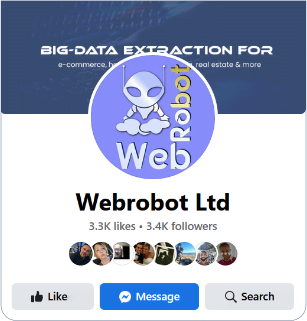
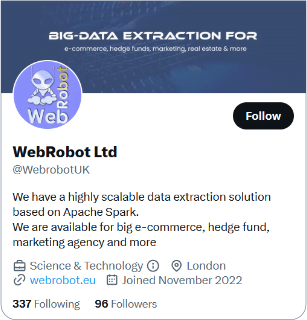


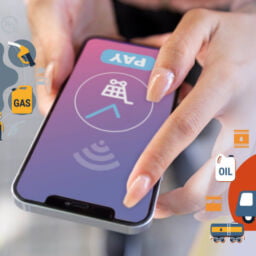



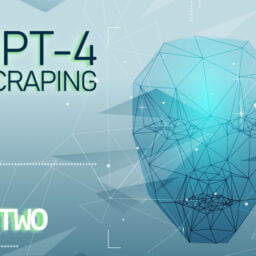








[…] trillions of data about hotels and restaurants. But which websites are better to scrape and analyse big data in the hospitality industry? Here are four hospitality categories with the top […]
[…] By Denis Giuffrè – WebRobot Marketing Artificial Intelligence Big Data Data […]